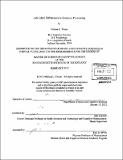| dc.contributor.advisor | John Gabrieli. | en_US |
| dc.contributor.author | Troyer, Melissa L | en_US |
| dc.contributor.other | Massachusetts Institute of Technology. Dept. of Brain and Cognitive Sciences. | en_US |
| dc.date.accessioned | 2012-04-26T18:48:57Z | |
| dc.date.available | 2012-04-26T18:48:57Z | |
| dc.date.copyright | 2012 | en_US |
| dc.date.issued | 2012 | en_US |
| dc.identifier.uri | http://hdl.handle.net/1721.1/70388 | |
| dc.description | Thesis (S.M.)--Massachusetts Institute of Technology, Dept. of Brain and Cognitive Sciences, 2012. | en_US |
| dc.description | Cataloged from PDF version of thesis. | en_US |
| dc.description | Includes bibliographical references (p. 117-122). | en_US |
| dc.description.abstract | This thesis aims to elucidate shared mechanisms between retrieval in sentence processing and memory retrieval processes in nonlinguistic domains using an individual differences approach. Prior research in individual differences in sentence processing has provided conflicting evidence as to whether the same memory mechanisms operate in linguistic processing, potentially a quite specialized cognitive domain, and in other, more general areas of cognition (Just & Carpenter, 1992; Caplan & Waters, 1999). This question has been primarily addressed from the point of view of capacity-based theories of working memory (Baddeley, 1986). Under these theories, verbal working memory is either comprised of multiple components including separate components for syntactic and non-syntactic verbal processing, or is dependent on a unitary pool of resources shared across all verbal domains. However, recent memory research has suggested that the capacity-theory architecture may be incorrect. Instead of a three-part memory system composed of focal attention, working memory, and long-term memory, a better model of the memory system may be bipartite, comprising focal attention and long-term memory. In the bipartite theory, working memory is viewed as a set of mechanisms mediating between these two stores, and accurately describes empirical data (McElree, 2006). If the latter hypothesis is correct, then it follows that the bipartite system underlying sentence processing should rely on the same set of working memory mechanisms as in general memory processes. In particular, a number of empirical studies have shown that both general memory and sentence processing are subject to interference from contextually-relevant intervening elements. Such interference is thought to occur at retrieval (as opposed to encoding) both for general memory tasks (e.g., retrieving items from a list) and in sentence processing (e.g., retrieving elements in long-distance syntactic dependencies). However, no systematic attempts have been made to investigate whether this interference results from the same processing limitations. In Study 1, performance on a battery of memory and cognitive tasks is compared to performance on sentence processing tasks. One of the sentence processing tasks correlated with multiple measures likely to rely on general memory mechanisms involved in resolution of retrieval interference. However, low internal reliability of the language tasks in the first study was observed. In Study 2, a series of sentence processing tasks is examined in order to determine which tasks exhibit the highest internal reliability. The results indicate that syntactic complexity manipulations presented in null (isolated) contexts exhibit highest internal reliability and are good candidates for future studies investigating individual differences in sentence processing. Suggestions for future studies investigating shared resources between sentence processing tasks and general memory mechanism are then discussed, informed by the results from these studies. | en_US |
| dc.description.statementofresponsibility | by Melissa L. Troyer. | en_US |
| dc.format.extent | 190 p. | en_US |
| dc.language.iso | eng | en_US |
| dc.publisher | Massachusetts Institute of Technology | en_US |
| dc.rights | M.I.T. theses are protected by
copyright. They may be viewed from this source for any purpose, but
reproduction or distribution in any format is prohibited without written
permission. See provided URL for inquiries about permission. | en_US |
| dc.rights.uri | http://dspace.mit.edu/handle/1721.1/7582 | en_US |
| dc.subject | Brain and Cognitive Sciences | en_US |
| dc.title | Individual differences in sentence processing | en_US |
| dc.type | Thesis | en_US |
| dc.description.degree | S.M. | en_US |
| dc.contributor.department | Massachusetts Institute of Technology. Department of Brain and Cognitive Sciences | |
| dc.identifier.oclc | 783795118 | en_US |
